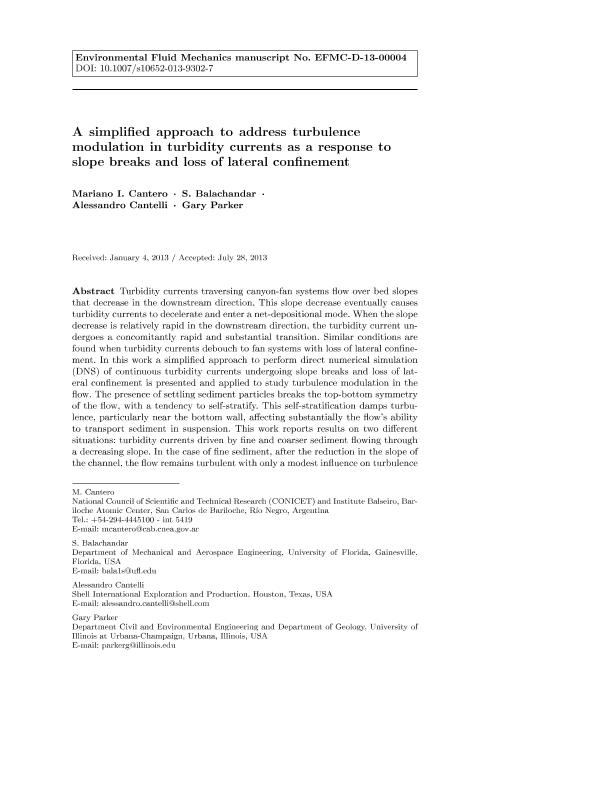Mostrar el registro sencillo del ítem
dc.contributor.author
Cantero, Mariano Ignacio

dc.contributor.author
Balachandar, S.
dc.contributor.author
Cantelli, Alessandro
dc.contributor.author
Parker, Gary
dc.date.available
2017-11-03T16:29:47Z
dc.date.issued
2014-04-01
dc.identifier.citation
Cantero, Mariano Ignacio; Balachandar, S.; Cantelli, Alessandro; Parker, Gary; A simplified approach to address turbulence modulation in turbidity currents as a response to slope breaks and loss of lateral confinement; Springer; Environmental Fluid Mechanics; 14; 2; 1-4-2014; 371-385
dc.identifier.issn
1567-7419
dc.identifier.uri
http://hdl.handle.net/11336/27551
dc.description.abstract
Turbidity currents traversing canyon-fan systems flow over bed slopes that decrease in the downstream direction. This slope decrease eventually causes turbidity currents to decelerate and enter a net-depositional mode. When the slope decrease is relatively rapid in the downstream direction, the turbidity current undergoes a concomitantly rapid and substantial transition. Similar conditions are found when turbidity currents debouch to fan systems with loss of lateral confinement. In this work a simplified approach to perform direct numerical simulation (DNS) of continuous turbidity currents undergoing slope breaks and loss of lateral confinement is presented and applied to study turbulence modulation in the flow. The presence of settling sediment particles breaks the top-bottom symmetry of the flow, with a tendency to self-stratify. This self-stratification damps turbulence, particularly near the bottom wall, affecting substantially the flow?s ability to transport sediment in suspension. This work reports results on two different situations: turbidity currents driven by fine and coarser sediment flowing through a decreasing slope. In the case of fine sediment, after the reduction in the slope of the channel, the flow remains turbulent with only a modest influence on turbulence statistics. In the case of coarse sediments, after the change in slope, turbulence is totally suppressed.
dc.format
application/pdf
dc.language.iso
eng
dc.publisher
Springer

dc.rights
info:eu-repo/semantics/openAccess
dc.rights.uri
https://creativecommons.org/licenses/by-nc-sa/2.5/ar/
dc.subject
Turbidity Currents
dc.subject
Turbulence Modulation
dc.subject
Sediment Transport
dc.subject
Direct Numerical Simulation
dc.title
A simplified approach to address turbulence modulation in turbidity currents as a response to slope breaks and loss of lateral confinement
dc.type
info:eu-repo/semantics/article
dc.type
info:ar-repo/semantics/artículo
dc.type
info:eu-repo/semantics/publishedVersion
dc.date.updated
2017-09-29T16:32:52Z
dc.journal.volume
14
dc.journal.number
2
dc.journal.pagination
371-385
dc.journal.pais
Alemania

dc.journal.ciudad
Berlin
dc.description.fil
Fil: Cantero, Mariano Ignacio. Consejo Nacional de Investigaciones Científicas y Técnicas; Argentina. Comisión Nacional de Energía Atómica. Gerencia del Área de Energía Nuclear. Instituto Balseiro; Argentina
dc.description.fil
Fil: Balachandar, S.. University of Florida; Estados Unidos
dc.description.fil
Fil: Cantelli, Alessandro. Shell International Exploration And Production; Estados Unidos
dc.description.fil
Fil: Parker, Gary. University Of Illinois At Urbana; Estados Unidos
dc.journal.title
Environmental Fluid Mechanics

dc.relation.alternativeid
info:eu-repo/semantics/altIdentifier/url/http://link.springer.com/article/10.1007/s10652-013-9302-7
dc.relation.alternativeid
info:eu-repo/semantics/altIdentifier/doi/http://dx.doi.org/10.1007/s10652-013-9302-7
dc.relation.alternativeid
info:eu-repo/semantics/altIdentifier/url/https://experts.illinois.edu/en/publications/a-simplified-approach-to-address-turbulence-modulation-in-turbidi
Archivos asociados
